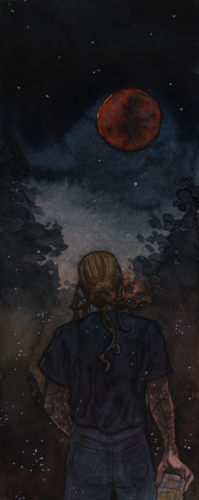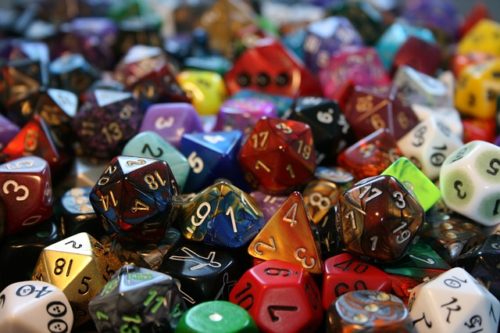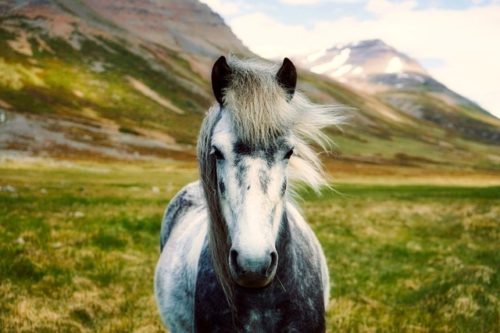Pagan Perspectives
[This column comes to us from our newest columnist, Luke Babb. Luke is a storyteller and eclectic polytheist who primarily works with the Norse and Hellenic pantheons. They live in Chicago with their wife and a small jungle of houseplants, where they are studying magic and community building – sometimes even on purpose.]
1.

“Blood Moon,” by Maria Klippert (@mkingamess) [courtesy].
The application asks very specific questions. “Where were you born? What time and day?” I consider just mailing it back with a printout of my star chart included to save them the time. Instead, I go to fetch my birth certificate from where it is tucked in the back of a drawer.
It’s one of the few pieces of documentation I have that still carries my birth name. The system for changing it is more arcane than any of the magic I have learned so far, and there is no guarantee that the State of Kansas will honor my request, even if I make all of the correct motions and say all the right words, even if my will is solid and my intent is clear. I have never been entirely solid in that will, not on this front.
So here I am, holding a dead name, a name I have not heard in years, and transcribing the specifics of my birth around that. I am offering myself for consideration.
2.
I must answer two questions to be allowed entry into the labyrinth. The first is always the hardest.
“Who are you?”
“Lucas, self-named.”
3.
The idea of true names entered my world with the works of T. A. Barron. This was high school, long before I had words for who I was or what I felt, but long after I knew that the name I carried didn’t fit. I was so delighted by this idea of a name that needed to be discovered, a magical name, one that unlocked a person’s self in a new and exciting way, that allowed them to grow out into a new size and shape.
In my memory, this idea is juxtaposed with a book I read at a much younger age, a picture book named Catkin. In it, an adventurer is tricked into saying his name, his birth name, to the king of the fairies, and is bound by that name to do as the king says.
In the particular cross section of magic and trans identity where I reside, we talk about true names a lot. What name is it that frees you? What name will bind you if said properly, if surrounded by the right symbols and intent? What value is there in being named, in naming yourself, in being gifted with a name by another?
4.
I named myself on a dark autumn evening, via text. I already had the name my parents would have given me, had the doctor said “It’s a boy!” when I arrived late and screaming to my birthday: Aaron Christian. Taking Christian as a middle name, however, seemed ironic to the point of being rude. Aaron, though, Aaron I liked. I identified with that Biblical figure – the practical one, the diplomat and quiet polytheist who provided a real world grounding to his brother Moses’s impassioned mysticism. That was a name I would take, but not as a first name. I wanted more than that role as I shaped myself.
“I want something solid,” I wrote to my friend, who was still a year away from naming themself. “Something that sounds like it’s from my family, something I don’t have bad connotations with.” It seemed like an impossible task, too weighty be resolved. My birth name had gone from an irritant to a sharp pain that flared up every time it was spoken. But what would be better? What name would fit?
5.

[Pixabay.]
“Why Tabetha?” I asked. It was a name I associated with brown cats and warm plaid skirts, fall evenings at a fireplace. I didn’t know anyone who wore it.
He shrugged. “I don’t know. It just suits you.” He gestured at my glasses.
In college I named my first RPG character Tabea. She was my age, and fierce, and she wore the name I had been gifted through two years of six-hour long sessions that took her as far as a character in that system could go. I played her as I was at eighteen years old, all emotion and reaction and very little planning for the future. When that game ended, I kept the figure I used to represent her on my desk through three moves. Then I put her away and went in search of a name that fit me better.
6.
The conclusion that we come to, every time a group of my friends sits down to discuss it, is that true names are subjective. For some, it might be a birth name, cleverly wielded, that freezes them in their tracks. For my friend it is her chosen name, spoken in its entirety, exactly as she says it herself. My teacher would say it is his magical name, the one he’s taken through ceremony and dream to illuminate the nature with which he walks his path. The magic is in the way that we think of ourselves, the bond we have between name and who we truly are.
What we usually agree on is that the name shapes us. We live into it, we are informed by its history and its connotations, we breathe it into the shape of our souls. Or perhaps it’s the other way around – maybe we choose the way we’re named to reflect something we only vaguely know about ourselves at the time.
“Choose your name carefully,” we tell each other, half joking. “You’re going to be stuck with it.”
7.
Ragnhildr, I called myself in Old Norse class. A Valkyrie name. Siobhan, in my brief foray into the SCA. Good enough, I thought. I won’t be here very long. I won’t have to hear many people say it. Nobody really uses names, past the introductions.
I always jumped when people used my name.
8.
The essay that got me into grad school still sits in its folder, a relic of an academic career I walked away from. It has my old name on it, just below the title. “Some Time Later He Bore a Foal: Loki and Old Norse Ideas of Femininity.”
It’s probably the first place my names appear together.
9.
When I wrote that paper, and later, when I named myself, I was working in a paradigm where I thought a lot about archetypes. The Trickster was my favorite: that liminal space, that breaking down of the barriers and traveling across the lines which shows that the lines weren’t ever really there to begin with. I did not know then why that was so important to me. But when I made my first altar it was to that trickster, a traveller. I got a statue of Hermes, a coyote pelt, and a few other small trinkets, and then started a fruitless search for something to represent Loki.
I loved him, if not more than the rest, then more personally, more for his stories. When I touched the statue of Hermes I thanked him for his guidance, his wisdom, and I offered him the things I knew he was offered in Greece: smoke, oil, the tending of his image. Loki was different. With no historical cultus to draw on, I offered love and the gifts that suggested themselves – small stones, smoke, laughter. I offered my thanks, and my rage, and I asked for help.
“I don’t know what I am doing, Mother of Monsters,” I said to Loki.“I don’t know if my family – I think I might lose them. I don’t think I am brave enough. I don’t think they’ll be proud of me anymore. I don’t think they’ll use my name.”
It was never, of course, a matter of courage. For me, naming myself was a matter of seeing clearly how much I was going to give up, how bad it was going to hurt, and deciding that it was better than the alternative.
Loki knows all about that.
10.

[Pixabay.]
Mother: a man who performs his gender in exactly the way he wants to, who shifts his body to hold life inside of it, who swallows down hearts and loves his children to the end of days. Father: a seiðkona, a handmaiden who passes through the halls of giants without anyone giving her a second glance. I loved my god first for his cleverness, for the lengths to which he would go in order to reach his goals. I love him now for showing me that I can shift my shape, that the body I have never truly lived in can be mine, can be made into a home, can be loved and give love to others.
Society calls monstrous the things that pose a challenge to the prevailing lies of the day. In 2018, trans people are monsters because we are world breakers. How wonderful to know that we are also beloved.
11.
By the end of the night, my friend and I were just listing off names at random. “Matthew,” I typed, sarcastically; too common, too tied to my ex to give any serious consideration. “Mark. Luke.”
I stopped before I got to John. Luke. There was a thought. A doctor, the most pragmatic of the apostles, and definitely a name my family would be proud of. And just one letter off.
In the SCA, before one takes a name there is someone who runs them through all of the possible derivations and nicknames that people will come up with – a valuable service when some of the options are Aethelfrith and Anfanasia. I ran through something like that, standing on a residential street in St. Louis. Luke Skywalker, obviously, but I was a big enough Star Wars fan that I was pleased by that association. (Skywalker was one of Loki’s names as well, a fact that made me grin.) The name might be too close, though; I wasn’t sure I wanted to bind myself so tight. Lucas, though, Lucas was a good, solid name. The Latin version of a Greek name, a nod to my other patron. I’d always wanted a nickname. Not too long, not too short. I tried it out, said it to the empty street.
“I’m not sure I’ll keep it,” I told my friend.
“Just try it on,” they suggested. “You can always change your mind.”
12.
The difficulty with being a hard polytheist (or, rather, an over-easy polytheist) is that I think of the gods as individuals, with their own emotions, their own inner lives. For me, that means that I can’t comfortably have a one-sided relationship. When Coyote pointed out that it wasn’t appropriate for me to work with him, I had to take him off the altar even though I hated to., I regretted it. I still do.
It also means that I am trying to tend relationships with people who are, generously, difficult to communicate with. I can reach out and touch my wife, ask for reassurance and affirmation that I am loved, that we are in this together. I cannot always do that with the gods, and sometimes I worry.
Maybe I am giving love to someone who doesn’t particularly care for me. Maybe I am fooling myself with the things I interpret as signs of affection, as divine intervention on my behalf. I’m a very creative person; I can read into things.
13.
“You remind me of him.” I was sitting on the bus with a friend, comfortable in the silence between conversations.
“Who?” I asked. There was no context, nobody we’d been talking about to tie the pronoun to.
“Loki.” Ze smiled, gestured at my face. “Something, I don’t know. Some of his energy? It’s nice, to see him in you.”
I bristled. “I’m my own person,” I pointed out. “I’m not – I don’t know. I’m not him.”
“Oh, no,” ze agreed. “You’re not. But you’re his.”
I sat, thinking about shaping, and being shaped, about names and choices, and my heart clenched around it. I smiled back.
“Yeah. I guess I am.”
* * *
The views and opinions expressed by our diverse panel of columnists and guest writers represent the many diverging perspectives held within the global Pagan, Heathen and polytheist communities, but do not necessarily reflect the views of The Wild Hunt Inc. or its management.
The Wild Hunt is not responsible for links to external content.
To join a conversation on this post:
Visit our The Wild Hunt subreddit! Point your favorite browser to https://www.reddit.com/r/The_Wild_Hunt_News/, then click “JOIN”. Make sure to click the bell, too, to be notified of new articles posted to our subreddit.